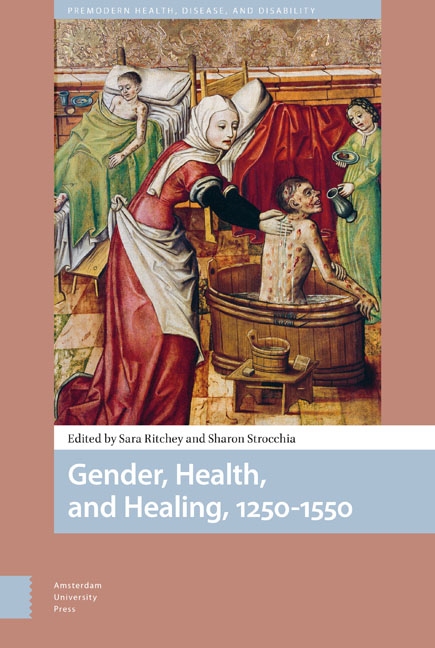Book contents
- Frontmatter
- Contents
- List of Figures and Tables
- Acknowledgments
- Abbreviations
- Introduction: Gendering Medieval Health and Healing: New Sources, New Perspectives
- Part 1 Sources of Religious Healing
- 1 Caring by the Hours: The Psalter as a Gendered Healthcare Technology
- 2 Female Saints as Agents of Female Healing: Gendered Practices and Patronage in the Cult of St. Cunigunde
- Part 2 Producing and Transmitting Medical Knowledge
- 3 Blood, Milk, and Breastbleeding: The Humoral Economy of Women's Bodies in Medieval Medicine
- 4 Care of the Breast in the Late Middle Ages: The Tractatus de passionibus mamillarum
- 5 Household Medicine for a Renaissance Court: Caterina Sforza's Ricettario Reconsidered
- 6 Understanding/Controlling the Female Body in Ten Recipes: Print and the Dissemination of Medical Knowledge about Women in the Early Sixteenth Century
- Part 3 Infirmity and Care
- 7 Ubi non est mulier, ingemiscit egens?: Gendered Perceptions of Care from the Thirteenth to Sixteenth Centuries
- 8 Domestic Care in the Sixteenth Century: Expectations, Experiences, and Practices from a Gendered Perspective
- 9 Bathtubs as a Healing Approach in Fifteenth-Century Ottoman Medicine
- Part 4 (In)fertility and Reproduction
- 10 Gender, Old Age, and the Infertile Body in Medieval Medicine
- 11 Gender Segregation and the Possibility of Arabo-Galenic Gynecological Practice in the Medieval Islamic World
- Afterword: Healing Women and Women Healers
- Contributors
- Index
3 - Blood, Milk, and Breastbleeding: The Humoral Economy of Women's Bodies in Medieval Medicine
Published online by Cambridge University Press: 23 June 2021
- Frontmatter
- Contents
- List of Figures and Tables
- Acknowledgments
- Abbreviations
- Introduction: Gendering Medieval Health and Healing: New Sources, New Perspectives
- Part 1 Sources of Religious Healing
- 1 Caring by the Hours: The Psalter as a Gendered Healthcare Technology
- 2 Female Saints as Agents of Female Healing: Gendered Practices and Patronage in the Cult of St. Cunigunde
- Part 2 Producing and Transmitting Medical Knowledge
- 3 Blood, Milk, and Breastbleeding: The Humoral Economy of Women's Bodies in Medieval Medicine
- 4 Care of the Breast in the Late Middle Ages: The Tractatus de passionibus mamillarum
- 5 Household Medicine for a Renaissance Court: Caterina Sforza's Ricettario Reconsidered
- 6 Understanding/Controlling the Female Body in Ten Recipes: Print and the Dissemination of Medical Knowledge about Women in the Early Sixteenth Century
- Part 3 Infirmity and Care
- 7 Ubi non est mulier, ingemiscit egens?: Gendered Perceptions of Care from the Thirteenth to Sixteenth Centuries
- 8 Domestic Care in the Sixteenth Century: Expectations, Experiences, and Practices from a Gendered Perspective
- 9 Bathtubs as a Healing Approach in Fifteenth-Century Ottoman Medicine
- Part 4 (In)fertility and Reproduction
- 10 Gender, Old Age, and the Infertile Body in Medieval Medicine
- 11 Gender Segregation and the Possibility of Arabo-Galenic Gynecological Practice in the Medieval Islamic World
- Afterword: Healing Women and Women Healers
- Contributors
- Index
Summary
Abstract
In humoral physiology the pregnant body was considered capable of transforming menstrual blood into nourishment for the foetus. After childbirth, blood became breast milk. However, this harmonic continuum was threatened when the maternal body was unable to transform blood into milk: in the Hippocratic aphorism 5.40, when blood cannot be transformed in the breasts of women, it indicates madness. We analyse medieval interpretations of this condition through the commentaries of university masters who examined this textual and clinical reality. We discuss how humoral physiology – an extremely flexible system of thought – could only conceive of maternal bleeding breasts with recourse to madness. Disharmony in the maternal body not only disrupted the physiological routine but also the symbolic function of mothering.
Keywords: sex difference, humoral theory, medieval physiology, medieval medical commentaries, Hippocratic gynecological aphorisms, female madness
This essay aims to contribute to two rich and overlapping conversations in the history of medieval and early modern medicine in western Europe. First, it offers new perspectives on the ongoing discussion of the significance of physiology in premodern conceptions of the body, with a particular focus on sexual difference. Second, it enters into dialogue with a growing body of historiography concerned with the peculiarly flexible character of humoral epistemology: a highly successful theoretical framework for understanding the workings of human bodies that lasted for two millennia. These two conversations come together in our exploration of late medieval discussions of ‘breastbleeding’, or the phenomenon in which physicians understood menstrual blood as failing to properly transform into milk, therefore making the maternal body unable to lactate. The medical significance of this condition is presented in Hippocratic aphorism 5.40, one that has not garnered much scholarly attention. In this particular and theory-laden configuration, the breastbleeding of women is presented as a clinical sign of madness.
Transformation is key to humoral epistemology. The ability of bodies to transform substances explained how bodies worked, how they stayed healthy, and how the sexes expressed marked differences. In this essay, we explore humoral physicians’ imaginings of the inability of women's bodies to successfully transform blood into milk or to purge it entirely, which inability, they asserted, could trigger toxic or other harmful consequences.
- Type
- Chapter
- Information
- Gender, Health, and Healing, 1250–1550 , pp. 93 - 118Publisher: Amsterdam University PressPrint publication year: 2020
- 4
- Cited by



